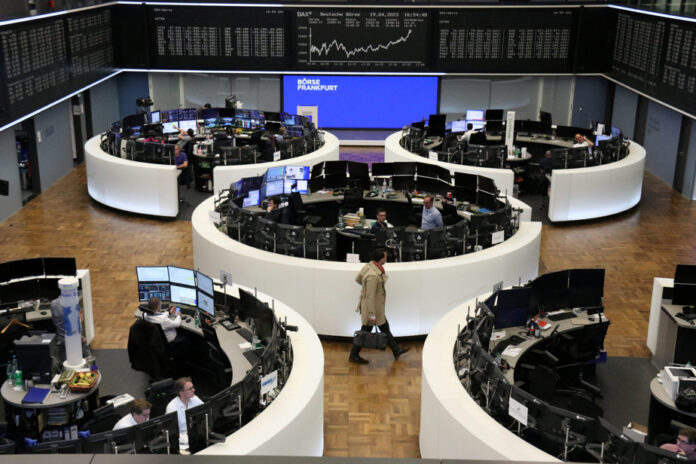(Paris) World stock markets are struggling to stay around balance on Friday, in Europe and the United States, in a context of growing fears of recession, despite good PMI indicators in Europe.
European stock markets have taken notice of a new series of company results and macroeconomic indicators. Paris fell by 0.12%, Frankfurt by 0.34% and Milan by 0.23% around 7:10 a.m. (Eastern time). London grabbed 0.09%.
On Wall Street, futures for all three major indices hovered around equilibrium.
In Asia, Tokyo lost 0.33%. Hong Kong ended down 1.57% and Shanghai 1.95%.
Economic growth in the private sector in the euro zone accelerated in April and the PMI index reached its highest level in eleven months, with the dynamism of services offsetting a decline in the manufacturing sector, according to the Flash PMI index published on Friday. by S
The data “overall shows a very positive picture of a firming up economic recovery,” observes Hamburg Commercial Bank economist Cyrus de la Rubia.
“Strong services activity is at odds with still high inflation and depressed real incomes,” said Capital Economics expert Rory Fennessy, who expects “weaker prospects” for the second half of the year. the year.
These figures left the bond market unmoved, where investors’ expectations of the evolution of monetary policies and economic conditions are reflected.
The rate on German 10-year debt was worth 3.52%, down from 3.53% on Thursday at the close.
“Input prices in the services sector have risen sharply, which should encourage the European Central Bank (ECB) to tighten its policy further at its next meeting, Philip Lane (the institution’s chief economist, editor’s note) having already confirmed a rate hike in May,” recalls Christophe Boucher, Chief Investment Officer of ABN AMRO IS.
Investors have yet to take notice of the April PMI indices in the United States.
The latest US macroeconomic statistics released on Thursday were all worse than expected. An economic slowdown that could worsen if the US central bank continues to raise interest rates.
The chairman of the Federal Reserve’s Philadelphia regional office, Patrick Harker, said on Thursday that “additional tightening may be needed” and wants to keep rates high going forward.
As for corporate results, their “mixed character”, according to Sebastian Paris Horvitz, director of research at Banque Postale AM, “didn’t really give the market a boost”.
The global optical giant EssilorLuxottica jumped 6.45% in Paris, the day after the publication of a sharp increase in turnover in the first quarter and higher than analysts’ forecasts.
Italian luxury house Salvatore Ferragamo saw its first-quarter sales fall 4%, due to a sharp drop in sales in the United States. Its stock fell 6.21% in Milan.
Swiss cement maker Holcim (-0.68% in Zurich) could make more than “30 acquisitions” in 2023, its boss said on Friday, raising his annual growth forecasts after a good start in the first quarter.
Oil prices fluctuated little. By 7:05 a.m. EST, a barrel of Brent North Sea oil for June delivery was down 0.11% to $81.01.
Its American equivalent, the barrel of West Texas Intermediate (WTI), for delivery in June, of which it is the first day of use as a reference contract, was worth 77.30 dollars (-0.08%).
The dollar and the yen were strengthening against most other currencies. Around 7 a.m. EST, the euro was down 0.06% against the dollar at $1.0963 to the euro. The yen gained 0.40% against the euro and 0.33% against the dollar. It was trading at the rate of 133.80 yen to the dollar, supported by more persistent than expected inflation in Japan.
Bitcoin was down 0.71% at $28,000.















